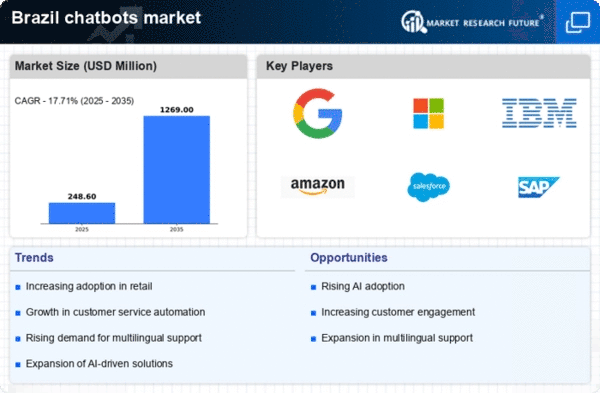Rising Focus on Personalization
In Brazil, there is a growing emphasis on personalization within the chatbots market. Companies are leveraging chatbots to deliver tailored experiences based on user preferences and behaviors. By 2025, it is anticipated that 65% of businesses will implement personalized chatbot interactions, enhancing customer loyalty and satisfaction. This trend indicates a shift towards more customer-centric strategies, where chatbots play a pivotal role in understanding and responding to individual needs. The chatbots market is thus evolving to meet these demands, fostering deeper connections between brands and consumers.
Growth of Mobile Messaging Applications
The proliferation of mobile messaging applications in Brazil is significantly impacting the chatbots market. With over 90% of the population using smartphones, businesses are increasingly integrating chatbots into popular messaging platforms like WhatsApp and Facebook Messenger. This trend is expected to drive a 40% increase in chatbot interactions by the end of 2025. The chatbots market is thus adapting to this mobile-first approach, allowing companies to reach customers where they are most active. This shift not only enhances accessibility but also fosters greater engagement with consumers.
Advancements in Natural Language Processing
Technological advancements in natural language processing (NLP) are driving the evolution of the chatbots market in Brazil. Enhanced NLP capabilities enable chatbots to understand and respond to customer queries more accurately and contextually. As of November 2025, it is projected that 75% of chatbots in Brazil will incorporate advanced NLP features, improving user experience and engagement. This development is crucial for businesses aiming to provide personalized interactions. The chatbots market is likely to benefit from these innovations, as companies invest in more sophisticated solutions to meet customer expectations.
Regulatory Support for Digital Transformation
The Brazilian government is increasingly supporting digital transformation initiatives, which is positively influencing the chatbots market. Policies aimed at promoting technology adoption in businesses are likely to encourage investments in chatbot solutions. As of November 2025, it is expected that government incentives will lead to a 30% increase in chatbot deployments across various sectors. This regulatory support not only facilitates the growth of the chatbots market but also encourages innovation and competitiveness among Brazilian companies, positioning them for success in the digital landscape.
Increasing Demand for Customer Support Automation
The chatbots market in Brazil is experiencing a notable surge in demand for customer support automation. Businesses are increasingly recognizing the efficiency and cost-effectiveness of deploying chatbots to handle customer inquiries. In 2025, it is estimated that around 60% of companies in Brazil will utilize chatbots for customer service, reflecting a growing trend towards automation. This shift not only enhances customer satisfaction by providing instant responses but also allows human agents to focus on more complex issues. The chatbots market is thus poised for significant growth as organizations seek to streamline operations and improve service delivery.
















